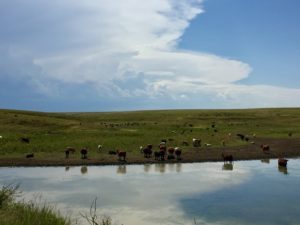 Given my interest in production agriculture and my plan to return to the family business after college, I’m pursuing a degree in Animal Science, with a concentration in business, and a minor in Ag Business. At this point, I’m almost halfway through my college experience, so I believe I’ve had adequate time to reflect on what I’ve learned and how I’ve bettered myself to return to the family ranch. So far, I’ve thoroughly enjoyed my experiences with this balance of science and business courses, and the spectrum of opportunities associated with the College of Ag.
Given my interest in production agriculture and my plan to return to the family business after college, I’m pursuing a degree in Animal Science, with a concentration in business, and a minor in Ag Business. At this point, I’m almost halfway through my college experience, so I believe I’ve had adequate time to reflect on what I’ve learned and how I’ve bettered myself to return to the family ranch. So far, I’ve thoroughly enjoyed my experiences with this balance of science and business courses, and the spectrum of opportunities associated with the College of Ag.
For as long as I can remember, I have been working for my family’s ranch, a cow-calf-yearling operation south of Wiggins and Ft. Morgan, Colorado. Whether I was processing cows, building fence, or mixing a feed ration, I’ve been able to see and experience first-hand many parts of the beef industry. Despite that, there is still plenty more for me to learn and understand, and my specific degree path helps optimize my education for my plan of returning home after graduation. To get the most out of my education and improving the operation, I’m working to add “tools” (new skills, knowledge, understanding, etc.) to the “toolbox” (what I can bring back to add to the ranch).
More specifically, I have particularly enjoyed my Feeds and Feeding and Principles of Meat Animal Evaluation classes. In my Feeds and Feeding class, the course material is very relevant, interesting, and applicable to my future as a rancher. Not only have I learned about specific livestock feeds, we’ve also covered in-depth material on how the type of feed is actually utilized by the animal’s body. As for the Meat Animal class, this has been particularly interesting for me, because I have little experience regarding the actual meat science aspect of livestock production. This class has provided me with experience learning about carcasses, taking various measurements, how yield and quality grades are assessed, and live animal evaluations of swine, sheep, and cattle. Both classes are very interesting and can have direct impacts with the cattle we raise.
While the classes serve as tremendous tools for my education, I’m well aware that not all learning takes place in a classroom. For instance, I am a member of the Wyoming Collegiate Cattle Association, and in that club, we’ve had incredible opportunities to see some key facets of the beef industry. Last year, I was fortunate enough to go on two trips with the group; one to the Krebs Ranch and Western Sire Services in Nebraska, and to tour the Cargill meat processing plant in Ft. Morgan, CO. Both of these opportunities are made possible because of active groups such as the WCCA. Overall, my degree program has done an excellent job of providing key resources and opportunities to continue adding “tools” to my “toolbox,” and eventually bringing something meaningful to the family business.
Blake Ferris
